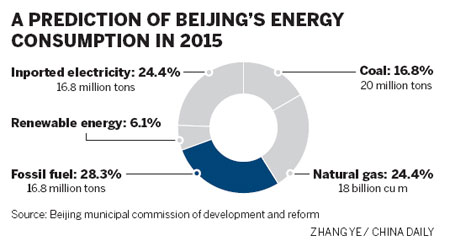Beijing's coal use to be capped
Updated: 2011-08-30 11:03
By Li Jing (China Daily)
|
|||||||||||

BEIJING - The capital city will cap its annual coal consumption at 20 million tons by 2015, as part of its plan to release less carbon and further reduce air pollution, the municipal commission of development and reform said on Monday.
The city will rely on other forms of energy, such as natural gas, petrol, diesel and import electricity from other provinces, to meet its increasing energy demand.
"With the city continuing to expand and more people settling in Beijing, the energy demand is set to increase, so the pressure to further bring down energy and carbon intensity is mounting," said Wang Yingjian, a senior official from the municipal commission of development and reform.
Beijing is the country's second largest energy consumer, and by 2015 its total energy consumption is expected to reach 90 million tons of coal equivalent, an increase of about 20 million tons from the 2010 level.
According to the commission, Beijing aims by 2015 to reduce its energy consumption for each 10,000 yuan ($1,566) of GDP by 17 percent compared with the 2010 level and carbon emissions by 18 percent.
The green goals are slightly stricter than the five-year national energy target of 16 percent and carbon intensity target of 17 percent.
Construction, vehicles and residential electricity consumption account for the bulk of the city's greenhouse gas emissions, according to Guo Qingshan, deputy director of the municipal commission's environment and resource department.
"We will continue to prioritize the development of public transport systems, and improve traffic efficiency through city planning," said Wang.
Between 2006 and 2010, Beijing cut its energy intensity by 26.59 percent, which was the best performance in the country.
"Beijing already boasts higher carbon productivity than most other cities in the country, thanks to its optimized industrial structure," said Zou Ji, China director of the World Resources Institute, a US-based environmental think tank.
The output of Beijing's service industry now accounts for 75 percent of the city's total revenue, which helps the city maintain a rapid economic growth without putting too much carbon into the air, said Zou.
To achieve its green goals, Beijing will also replace four large-scale coal-fired power plants with natural-gas electricity generation systems.
It will also increase the share of renewable energy in the whole energy mix from 3.2 percent in 2010 to 6 percent by 2015, officials said.












